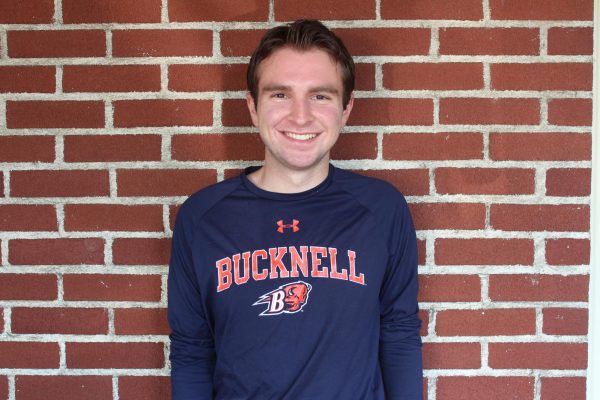After just a year-and-a-half on campus, Bucknell University Chief of Public Safety Anthony Morgan is finally seeing his vision for creating a new model for community fostering on-campus law enforcement become a reality.
In order to enhance community relationships and improve security before the 2022-23 academic year, Morgan instituted several new Public Safety incentives and initiatives, including:
- Adding a Public Safety therapy dog, Digger, the Bernese Mountain Dog.
- Launching the BSAFE app, which can be downloaded from the Apple Store or Google Play by students, faculty and staff.
- Hiring two community service officers, Bonnie Rake and Romale Brown, who are unarmed and can respond to less threatening Public Safety calls.
- Purchasing a virtual-reality training system to more effectively train Public Safety officers and campus community partners.
- Offering active shooter, situational awareness, de-escalation and CPR training to the campus community.
- Conducting a full-scale active shooter drill with local first responders.
- Hosting a summer campus sexual assault symposium and crisis intervention team training with area law enforcement.
- Moving Card Services to Public Safety.
Many of the changes that came to campus, according to Morgan, are due to constant dialogue with the campus community, which furthers and enhances the partnership desired between Public Safety and Bucknellians.
“We made it a stated goal to continue to strengthen community relationships and public trust while striving for public safety excellence on campus, and these changes continue to strengthen that commitment,” Morgan said.
Digger, the Public Safety Dog
One idea that came especially from Bucknell students was the idea of a campus therapy dog. Morgan thought it was a great way to increase student engagement opportunities. Digger was introduced to this year’s new students during a Public Safety orientation session and will eventually be housed in the Office of Public Safety daily and ride along with officers on shifts.
The BSAFE App
Additionally, the BSAFE app can allow users’ phones to act as a mobile blue light if they choose to enable the location feature. By tapping the blue light function button, they can request Public Safety to respond immediately to their location. The app’s other functions allow users to:
- Report a tip to Public Safety and add photos or video to aid in their response and investigation.
- Request a “friend walk,” which allows them to share their location and have a friend or family member virtually follow them to their destination. They can also trigger a call to emergency services if needed.
- Use a “social escape” feature to provide aid in getting to a safe location if they need to leave an uncomfortable or awkward situation.
Public Safety can also send emergency alerts through the app.
A New Public Safety Approach
Through a staff of sworn police officers and unarmed community service members, Public Safety has enforced a tiered response model in the event of any emergency. For less threatening calls such as vehicle lockouts, room unlocks, vehicle jumpstarts, safe escorts and certain noise complaints, an unarmed community service officer can respond. For criminal matters and alarms, a Public Safety officer will respond.
Morgan wishes to hire two more community officers, who will also be tasked with maintaining and establishing community through campus initiatives.
The virtual-reality training unit will allow officers to conduct training under more realistic virtual conditions, better preparing them for response to safety-related situations. The full-scale active shooter drill with local first responders in June enhanced that training with a realistic drill.
Building a community with local law enforcement is also part of Morgan’s plan. Jamie Grobes, Assistant Director of Public Safety, Community Engagement and Partnerships, organized the summer campus sexual assault symposium and crisis intervention team training with area law enforcement. Both events were well attended, with the sexual assault symposium having 40 attendees, including representatives from multiple surrounding police departments, both chiefs and officers, as well as a local district judge.
Overseeing Card Services provides Public Safety better control over who has access to campus buildings.
“Being involved with access control simply makes sense because of the unique security challenges and risks from who’s coming in and out of particular buildings and what permissions they are given,” Morgan says.
Morgan says Public Safety will continue the dialogue with its campus community partners on future initiatives designed to enhance campus safety.






















